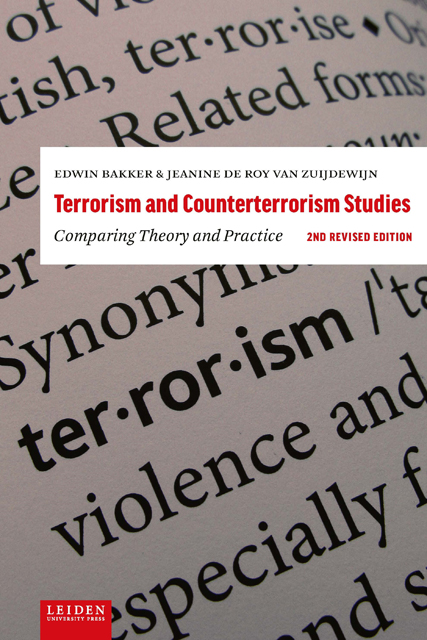Book contents
- Frontmatter
- Contents
- List of boxes & figures
- Preface
- About the authors
- Acknowledgements
- 1 Definition and nature of terrorism
- 2 History of terrorism
- 3 Terrorism studies
- 4 Assumptions about terrorism
- 5 Assumptions about counterterrorism
- 6 Dealing with the impact of terrorism
- 7 Trends and developments in (counter)terrorism and a future research agenda
- Index
1 - Definition and nature of terrorism
Published online by Cambridge University Press: 12 January 2023
- Frontmatter
- Contents
- List of boxes & figures
- Preface
- About the authors
- Acknowledgements
- 1 Definition and nature of terrorism
- 2 History of terrorism
- 3 Terrorism studies
- 4 Assumptions about terrorism
- 5 Assumptions about counterterrorism
- 6 Dealing with the impact of terrorism
- 7 Trends and developments in (counter)terrorism and a future research agenda
- Index
Summary
Introduction
Terrorism is a highly complex, highly subjective and politically sensitive topic. In this chapter we will address some of this complexity, subjectivity and sensitivity. We will show why and how terrorism is receiving much attention from both the media and governments and how it has affected societies. After discussing the geographical distribution of attacks and casualties, we will arrive at the problem of defining terrorism. We will explore the questions of what can be labelled terrorism and what not, and why it is actually important (and difficult) to define the term. Finally, we will discuss the nature of terrorism: what it is about, what it does to society, and how it works.
That terrorism indeed has an impact on society we can read in the papers and see on television and the internet. In fact, terrorism makes headlines almost every day and almost everywhere around the globe. In recent years, major attacks have taken place in many parts of the world, leaving hardly any region untouched. The most lethal and most ‘spectacular’ attacks have not only received national attention, but in many cases have made headlines across the world. For instance, the Paris attacks on 13 November 2015 not only were breaking news in France and the rest of Europe, but also resulted in headlines in newspapers as far away as Indonesia. Readers of Media Indonesia were confronted with a picture of the attack and its victims with a headline saying, ‘Europe on alert after the Paris tragedy’. Other examples are international responses to the many attacks by the terrorist organisation Boko Haram in Nigeria. Their kidnapping of young girls in April 2014 made it to the front pages of newspapers around the world. The US-based CBS News reported, ‘100 schoolgirls kidnapped in Nigeria by suspected extremists’, and the newspaper China Daily reported, ‘China condemns Nigeria kidnappings’. US First Lady Michelle Obama and Pope Francis were among the various international figures who joined the #BringBackOurGirls social media campaign. Also in 2014, the rise of Islamic State (formerly known as Islamic State of Iraq and the Levant - ISIL) and the atrocities committed by that organisation led to worldwide condemnation.
- Type
- Chapter
- Information
- Terrorism and Counterterrorism StudiesComparing Theory and Practice, pp. 21 - 50Publisher: Amsterdam University PressPrint publication year: 2022



